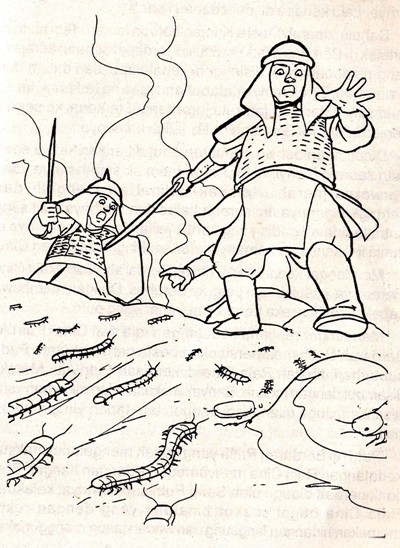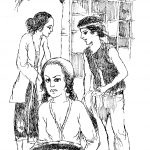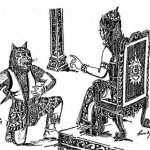
The Jombang Taste presents the story of the legend of Roro Jonggrang which is the background of the origins of the Prambanan temple. In ancient times there was a kingdom in the Pengging area. The king had a son named Joko Bandung. Joko Bandung is a mighty young man like his father, he also has various high powers of magic. In fact, it is said that his supernatural powers are higher than his father because Joko Bandung likes to learn from magic hermits.
In addition, in the Prambanan area there is a kingdom, the king of which is named Ratu Boko. The king had a beautiful-faced daughter named Roro Jonggrang. Ratu Boko is big and tall, so most people think of him as a descendant of a giant. Between the Pengging Kingdom and the Prambanan Kingdom there was a war. The legendary story of Roro Jonggrang states that at first the King of Pengging lost. Many Pengging soldiers died on the battlefield.
Hearing the defeat of his father’s troops, Joko Bandung was determined to catch up with his father’s troops. On his way in the middle of the forest, Joko Bandung met and fought a giant named Bandawasa. The story of the origin of Prambanan Temple states that before the death of Bandawasa, who was also highly knowledgeable, it had infiltrated the spirit of Joko Bandung and asked his name to be combined with the young man. So that the son of the King of Pengging was named Joko Bandung Bandawasa.
Joko Bandung advanced to the battlefield, for days the battle went on fiercely between him and Ratu Boko, but in the end the young man was able to defeat and kill Ratu Boko. Ratu Boko has been defeated by him. Therefore, the entire contents of Ratu Boko’s kingdom is owned by Joko Bandung.
When Joko Bandung entered the Kaputren palace he saw the beautiful Roro Jonggrang, Joko Bandung immediately fell in love and wanted to confuse him. However, Roro Jonggrang tried to avoid his wish, because Roro Jonggrang knew that his father’s killer was Joko Bandung.
Based on the story of the origin of the Prambanan temple, to reject, of course, Roro Jonggrang did not dare to be afraid of being killed by Joko Bandung. So Roro Jonggrang put forward a condition, he wanted to be married to Joko Bandung as long as the young man was willing to build a thousand temples and two wells in one night.
According to Roro Jonggrang’s opinion, it was certain that Joko Bandung would not be able to fulfill this very heavy request. Unexpectedly, Bandawasa, who was united in Joko Bandung, stated that he was able to help Joko Bandung.
Joko Bandung Bandawasa asked for help from spirits. These spirits come from the jinn and dedemites who have extraordinary powers. They worked hard after sunset, and one by one the temple requested by Roro Jonggrang approached completion.
Seeing this incident, Roro Jonggrang was surprised and also surprised. Because so many temples are almost finished. In the middle of the night when the spirits continue the task of completing the building of the temple that only remains.
Roro Jonggrang woke up the Prambanan village girls to pound rice while beating the pestle on the mortar so that they heard a boisterous voice. The rooster crowed and shouted. Hearing these voices, the spirits immediately stopped their work. He thought it was morning and the sun had risen.
Roro Jonggrang’s request could not be fulfilled due to the lack of one temple building. Bandung was angry, because of Roro Jonggrang’s trick. It was then that Bandung approached the girl he loved and said. “Roro Jonggrang! You’re just making excuses. If you don’t want to say you don’t want to, don’t try to trick me. You are stubborn as a rock!”
The words of the magic young man could not be withdrawn anymore. Instantly Roro Jonggrang turned into a large stone statue at Prambanan temple. The temple that was made by Joko Bandung even though the number has not reached a thousand is called Sewu Temple which is adjacent to the Roro Jonggrang Temple. So Prambanan Temple is also called the Roro Jonggrang temple.
The mandate of the story of the origin of the Prambanan temple has a moral message so that we always behave well towards others. If you want to convey your heart’s intent, you must say it honestly and frankly. The moral message of the legend of Roro Jonggrang is that good will result in good, while evil will end in suffering. Hopefully this Central Javanese folklore can add to your insight.
References:
Hidayat, Kidh 2008. Folk tales throughout the archipelago. Jakarta: Indonesian literature.
Reza, Marina Asril. 2008. Best Story Original Archipelago. Jakarta: Visimedia.
Optima Pictures team. 2010. Archipelago Stories Collection of Fairy Tales, Epic, Fables, Legends, Myths and History. Jakarta: TransMedia.
Soemanto, Bakdi. 2003. Folklore from Yogyakarta. Jakarta: Grasindo.
Sumardiyanto, Anwar and Eka Katminingsih. 2011. Folk Story. Sidoarjo: World of Science.



Tinggalkan Balasan